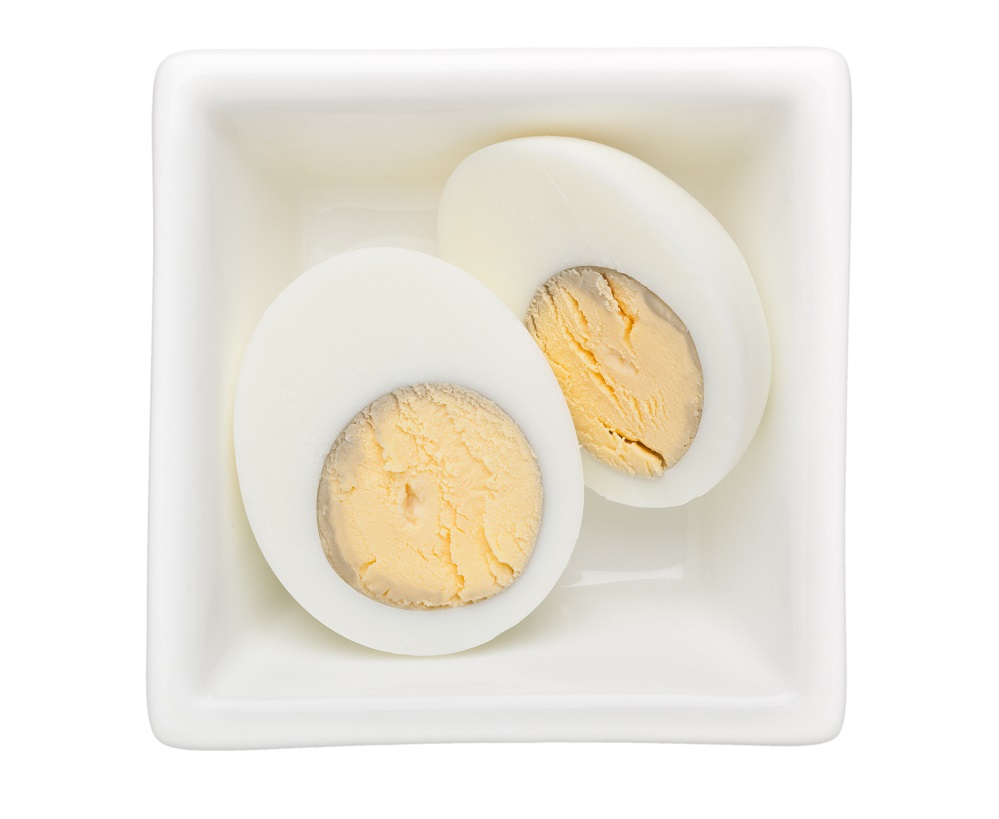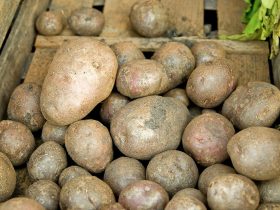You can eat over-cooked hard-boiled eggs. Though the texture may be dry and unpleasant, especially the powder-like yolk at the center, freshly cooked hard-boiled eggs should still be entirely edible so long as they were not spoiled prior to cooking. If the texture and flavor of overcooked hard-boiled eggs is not to your liking, it is a viable option to still make them palatable with a variety of added ingredients.
Why is the Yolk of Overcooked Boiled Eggs Green?
A green film forms around the yolk of the egg as molecular changes occur under extended periods of high temperatures.

If one were to examine this process beneath a molecular microscope, the formation of bonds between hydrogen and sulfur between the yolk and the egg whites would be near-instantaneous in the correct conditions.
This new compound, referred to as hydrogen sulfide, initially begins as a sublimated solid – that is to say, when first formed, hydrogen sulfide is a gas. The thin layer of green surrounding the egg yolk is simply a small deposition of the total amount of hydrogen sulfide that is produced when an egg is over-boiled.
Hydrogen sulfide is also responsible for the unique smell over-boiled eggs have. And, while this gas is indeed harmful to humans when inhaled, there is not enough produced when over-boiling an egg to be dangerous in any form.
Overcooked hard boiled eggs are perfectly safe to eat, though unpleasant.
How to Tell if an Egg is Overcooked
As an egg is brought beyond its usual cooking point by the high temperatures of boiling, the proteins within the egg will begin to unravel into longer structures. This, at a macro level, presents as the egg whites and yolk coagulating into a solid.
However, if the egg is cooked for too long or at too high a temperature, the molecular structure of the proteins themselves begin to break down and interact with the surrounding compounds, producing a chemical known as hydrogen sulfide. This is immediately visible as a green or olive colored film across the surface of the yolk.
Apart from this discoloration of the surface of the egg’s yolk, the egg whites themselves will begin to turn brown as they undergo a chemical change referred to by chefs as the Maillard reaction.
Visual changes aside, another way to tell whether the egg is overcooked is if the shell has begun to form cracks, especially around the base of the egg. These cracks represent fault lines in the structure of the calcium, of which gas escaping the egg squeezes through as water evaporates from inside.
Alternate Ways to Eat Overcooked Hard-Boiled Eggs
As over-boiled eggs can be unpleasant to eat, there are quite a few ways to utilize this ingredient so it will not go to waste.
The primary and easiest way to incorporate overcooked boiled eggs into a dish is to simply mash it up with mayonnaise and any vegetables of your choice, essentially making an egg salad. The high fat content will remedy the textural dryness of the eggs, as well as complement its flavor perfectly.
Much like egg salad, creating deviled eggs by creaming the yolks remedies much the same over-dried and powdery texture that over-boiling eggs creates. While this depends on the sort of liquid you are using to cream the yolk, it is still a marked improvement to its original form.
Alternatively, one may dice up the egg and mix it into a salad as a topping, though the rubbery texture of the egg may be disconcerting, so it is best to use salad ingredients that can help mask this texture such as shredded lettuce and roasted chicken.
How Long Does It Take to Overcook a Hard-Boiled Egg?
Boiling eggs is a highly variable process depending on the relative internal temperature of the egg. However, generally, most large-sized eggs reach their ideal cooked form at approximately eight minutes.
Usually, if the egg is subjected to heat for a longer period of time than eight to ten minutes, it will begin to grow rubbery as the proteins within the yolk and white start to break down, reduced by the high temperatures to a more basic sulfur compound.
While the ideal texture and cook time for eggs is individually different depending on your preferences, it is best not to cook it for less than four minutes, as the egg may still be raw and presents a small risk of transmitting salmonella if eaten.
How Long do Hard-Boiled Eggs Last at Room Temperature?
As eggs are extremely high in protein and possess a porous shell that microbes are capable of passing through, boiling is an excellent way to ensure that any bacteria or fungi that may have made its way within their shell is dead.
However, once the eggs have been removed from the high temperatures of boiling water and are allowed to cool off on your counter-top, new colonies of fungi and bacteria will begin to take root, especially if the egg has been overboiled and the shell has begun to crack.
If kept on your countertop with no other attempts of preservation made, boiled eggs are only considered safe to eat for up to two hours, as any longer and microbial life forms will have produced harmful toxins in the egg2.
This is doubly so if the egg is heated prior to being cooled off at room temperature, as condensation of water will occur, further accelerating their spoilage by providing not only food but also water to the bacteria and fungi that opportunistically appear.
In a room with higher temperatures than 90°F, the egg will only be safe to eat for an hour or less1. This is further confirmed by the U.S. Department of agriculture, of whom states “Make sure eggs are refrigerated within two hours after cooking, and don’t leave refrigerated cooked eggs out at room temperature for more than two hours.”
References
1. Unknown Author. (July 2019) “Why Should Eggs Be Refrigerated?” U.S. Department of Agriculture AskUSDA https://ask.usda.gov/s/article/Why-should-eggs-be-refrigerated
2. Unknown Author. (July 2019) “How long can you keep hard cooked eggs?” U.S. Department of Agriculture AskUSDA https://ask.usda.gov/s/article/How-long-can-you-keep-hard-cooked-eggs


Hi, I'm Dom
Dom Eats was started to help other people fall in love with food. While cooking can feel intimidating, it doesn't have to be.